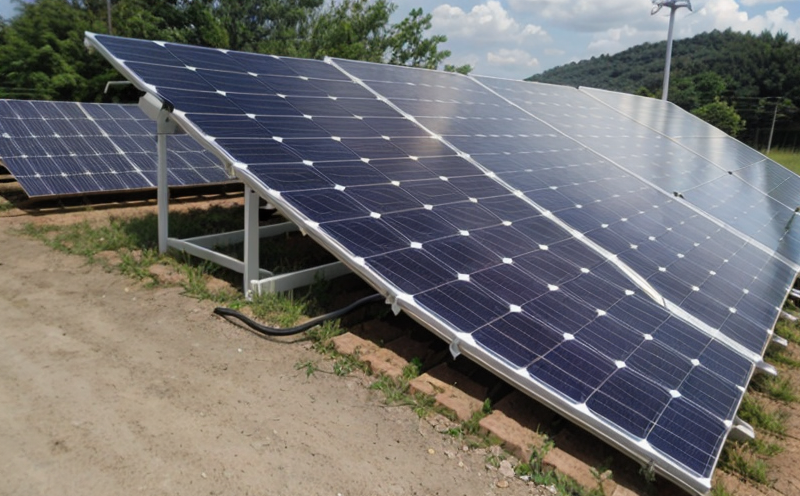IEC 61730-1 Construction Requirement Safety Testing
The International Electrotechnical Commission (IEC) standard IEC 61730-1 is a critical document for the photovoltaic industry. It provides essential guidelines and requirements to ensure that solar panels and photovoltaic modules are safe, reliable, and meet international standards. Compliance with this standard is mandatory not only in Europe but also globally where stringent safety regulations apply.
IEC 61730-1 focuses on the constructional requirements of photovoltaic (PV) modules, which include mechanical tests, electrical insulation, connectors, and junction boxes. These tests are crucial to ensure that PV modules can withstand harsh environmental conditions such as high winds, extreme temperatures, and moisture. The standard is designed to protect both personnel and property from potential hazards associated with the use of solar panels.
The testing process under IEC 61730-1 involves a series of rigorous procedures aimed at verifying that PV modules are constructed in accordance with recognized safety practices. This includes mechanical strength tests, water resistance checks, electrical insulation assessments, and more. Each test is designed to simulate real-world conditions that the module may encounter during its operational life.
One of the key aspects of IEC 61730-1 is the focus on ensuring that all components within a PV module are properly connected and insulated. This includes connectors and junction boxes, which can be exposed to various environmental stresses over time. By adhering to these safety requirements, manufacturers can help prevent fires, electrical shocks, and other hazards associated with improperly constructed modules.
The standard also emphasizes the importance of proper labeling and documentation. All PV modules that undergo IEC 61730-1 testing must be clearly labeled according to specific guidelines provided in the document. This ensures traceability and accountability throughout the supply chain.
In summary, compliance with IEC 61730-1 is not just about meeting regulatory requirements; it's about ensuring long-term safety and reliability for solar energy systems worldwide. By adhering to these standards, manufacturers can build trust with their customers while also protecting against potential risks.
Why It Matters
The importance of IEC 61730-1 cannot be overstated in the context of renewable energy and solar technology. This standard is designed to safeguard both personnel and infrastructure by ensuring that PV modules are built with robust construction methods. The stakes are high when dealing with large-scale installations, where even minor issues can lead to significant safety concerns.
By adhering to IEC 61730-1, manufacturers demonstrate their commitment to quality and safety, which ultimately builds consumer confidence in solar energy solutions. This is particularly important given the rapid growth of renewable energy as a key component of sustainable development strategies worldwide.
The standard also plays a crucial role in ensuring consistency across different regions and markets. With varying local regulations and standards, having a globally recognized benchmark like IEC 61730-1 helps streamline compliance processes for manufacturers operating internationally. This reduces the need for multiple certifications and simplifies market entry for solar products.
Furthermore, IEC 61730-1 promotes innovation by setting clear expectations for design and manufacturing practices. As technology evolves, the standard must keep pace with advancements while maintaining its core principles of safety and reliability. This balance encourages developers to explore new materials and techniques without compromising on essential standards.
In conclusion, compliance with IEC 61730-1 is not only a legal requirement but also an ethical obligation for companies involved in the solar industry. It ensures that products meet high-quality benchmarks, fosters trust among stakeholders, and supports broader goals related to sustainability and environmental protection.
Industry Applications
- Solar Farms: Ensuring that individual modules used in large-scale solar farms comply with IEC 61730-1 helps guarantee the overall safety of the entire installation. Non-compliant components can pose risks during operation.
- Rooftop Installations: For residential and commercial rooftops, adhering to this standard ensures that the chosen PV modules will perform reliably under various climatic conditions while minimizing the risk of accidents or damage.
- Marine Applications: In coastal environments where exposure to saltwater is a concern, compliance with IEC 61730-1 helps protect against corrosion and degradation of critical components.
- Aerospace Systems: While not directly applicable in all cases, the principles embodied in this standard can inspire similar safety measures for space-based solar power systems.
The wide applicability of IEC 61730-1 underscores its significance across various sectors within renewable energy. Its provisions are essential for maintaining high standards of quality and reliability throughout the supply chain, from manufacturing to deployment.
Customer Impact and Satisfaction
Compliance with IEC 61730-1 has a direct impact on customer satisfaction by addressing key concerns related to safety and performance. When manufacturers adhere to these stringent requirements, they demonstrate their dedication to delivering high-quality products that meet international standards.
Customers benefit from increased confidence in the reliability of solar energy systems, knowing that every component has been rigorously tested according to recognized protocols. This translates into reduced maintenance costs over time since well-constructed modules are less likely to fail prematurely due to poor design or manufacturing defects.
Additionally, compliance fosters trust between suppliers and end-users, creating a positive reputation for brands that prioritize safety above all else. This can lead to enhanced brand loyalty and repeat business opportunities as satisfied customers become advocates for quality products.
In summary, IEC 61730-1 plays a vital role in enhancing customer satisfaction by ensuring that every aspect of PV module construction meets the highest standards of safety and performance. It serves as a bridge between manufacturers and consumers, providing peace of mind knowing that only the best materials and techniques are being employed.





